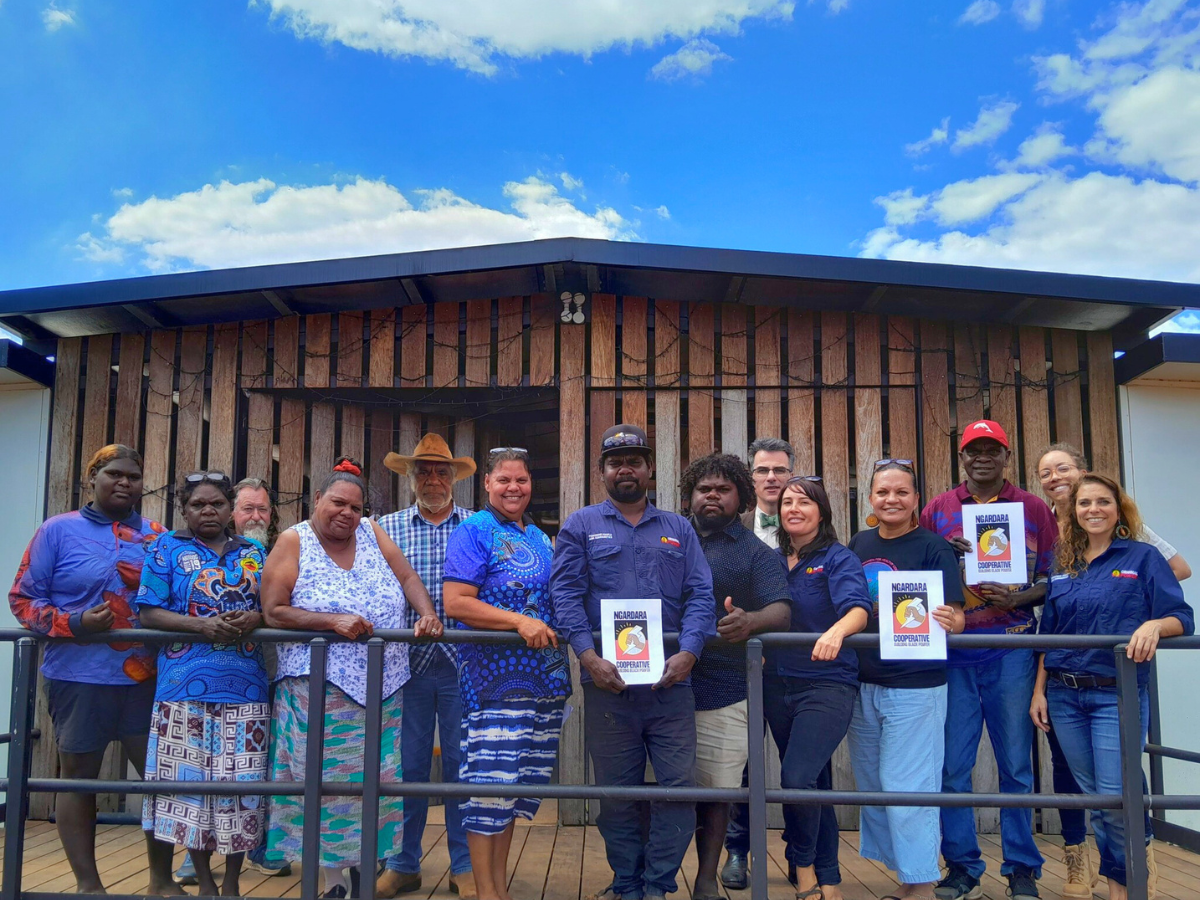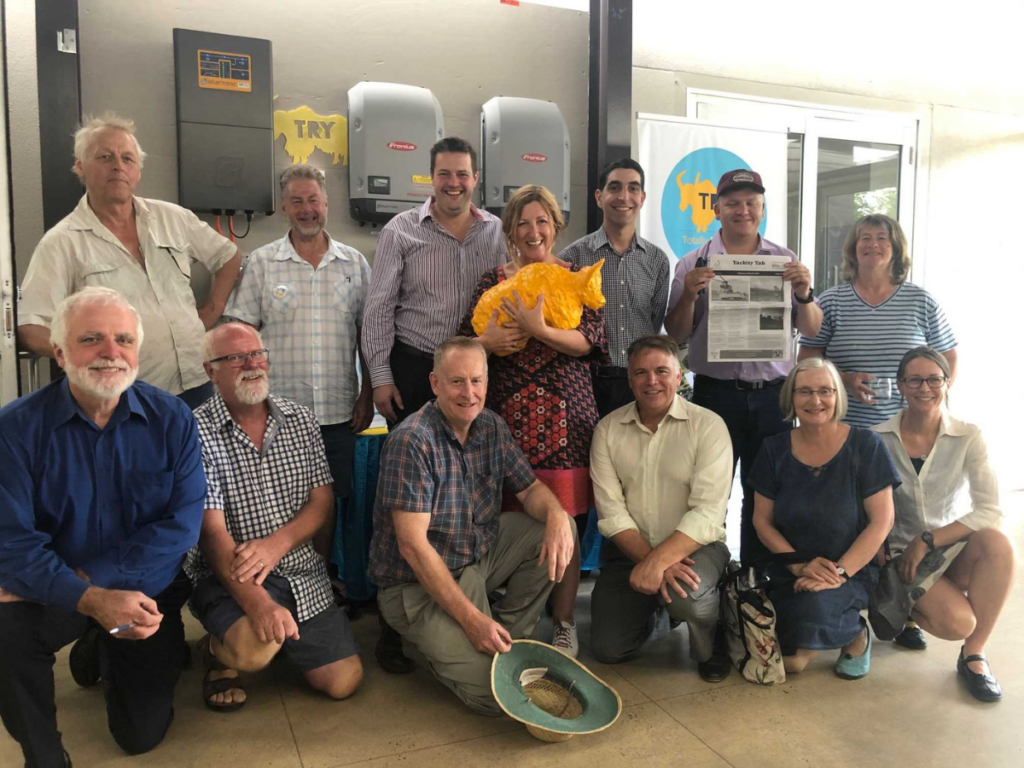Foundation for Rural & Regional Renewal (FRRR)
Nearly $280,000 supports 16 initiatives across Australia
FRRR has awarded $278,693 in grants for projects that will help remote, rural and regional communities decarbonise, adapt to a changing climate, and mitigate the risks of global warming.

The 16 community-driven projects are the first through FRRR’s Community Led Climate Solutions program, thanks to support from Boundless Earth and Hand Heart Pocket.
Grants include $14,957 to support regenerative farming practice for soil health and emissions reductions in Macleay, NSW; $20,000 to build energy efficiency for social housing in Gympie, QLD; $20,000 to provide information and links to employment pathways through pop-up events in Gippsland, VIC; and $20,000 to enable a local Indigenous community in NT to build their capacity in order to establish their own solar microgrid and reduce reliance on diesel-powered electricity.
Sarah Matthee, FRRR’s General Manager – Partnerships & Services, said that the applications reflected the diversity of community organisations in Australia, the variety of climate solutions underway across rural communities, and the breadth of opportunities available to enable local groups to take action.
“The requests we received reinforce the fact that these communities are being impacted socially, economically and environmentally by increasing temperatures and extreme weather events. These communities are aware and concerned about the impacts of a changing climate, and these projects demonstrate their ambition to engage locals in conversations about their region’s future, and lead their community in taking action to reduce emissions.
“People living in remote, rural and regional communities have the knowledge and ideas to implement solutions that can help to decarbonise, mitigate climate risks, and adapt in a changed climate environment. But they need a hand to take action.
“With the support of Boundless Earth and Hand Heart Pocket, we’ve been able to fund 16 place-based, community-led climate solutions projects, which we hope will influence and deliver change for social, environmental and economic community benefit across remote, rural and regional Australia,” Ms Matthee said.
Organisations awarded Community Led Climate Solutions grants, and their funded projects, include:
- Original Power Ltd with Ngardara Cooperative Ltd – Borroloola, NT – Support a local, Indigenous community to establish their own solar microgrid, providing them with a sustainable energy source and reducing their reliance on diesel-powered electricity – $20,000
- Surfers for Climate – Byron Bay, NSW – Engage and educate tradespeople who surf in sustainable and circular building practices through local workshops in coastal NSW – $20,000
- Environmental Advocacy in Central Queensland Inc – Yeppoon, QLD – Drive education and engagement on climate change and the transition to renewable energy sources in Central Queensland by screening a documentary and presenting an experienced panel including local and national representation – $3,905
- Cire Services Incorporated – Yarra Junction, VIC – Promote circularity practice with reuse and repurpose workshops that will reduce landfill and develop skills that enable sustainable practices – $20,000
FRRR and its donor partners are committed to funding community-led solutions that reduce emissions and address the impacts of climate change. Community-led solutions help drive positive and sustainable environmental, social and economic outcomes for remote, rural and regional Australia. FRRR welcomes further contributions to this collaborative pool of funds to grow the impact that can be generated across remote, rural and regional Australia. For more information, please visit https://frrr.org.au/giving/.
The full list of grant recipients and their projects are below.
| Organisation | Project | Location | Grant | |||
|---|---|---|---|---|---|---|
| NEW SOUTH WALES | ||||||
| Container of Dreams Ltd | Container of Dreams Battery Storage and Charging Station Build community capacity to reduce emissions through a communal solar battery charging station to decrease reliance on fossil fuel generators. | Drake | $20,000 | |||
| Macleay Landcare Network Inc | Regenerative Farming Soils in the Macleay Project Build organisational capacity to engage and support landowners’ adoption of regenerative agriculture practice through workshops and volunteer training. | Kempsey | $14,957 | |||
| Surfers for Climate | The Trade Up by Surfers for Climate Engage and educate tradespeople who surf in sustainable and circular building practices through local workshops in coastal NSW. | Byron Bay | $20,000 | |||
| NORTHERN TERRITORY | ||||||
| Original Power Ltd on behalf of Ngardara Cooperative Ltd | Ngardara Community Solar Microgrid - Community Clean Energy and Climate Solutions Capacity Development Support a local, Indigenous community to establish their own solar microgrid, providing them with a sustainable energy source and reducing their reliance on diesel-powered electricity. | Borroloola | $20,000 | |||
| QUEENSLAND | ||||||
| 350.Org Ltd | Power Up Masig Develop the community engagement and prefeasibility model for a just transition to community-owned renewable energy supply in Torres Strait Island, Masig. | Masig Island | $20,000 | |||
| Bundaberg Fruit and Vegetable Growers Ltd | Water Wise Gardens - Revolutionising School Landscapes With Low Water Solutions Build capability in schools vulnerable to climate change impacts on water to sustain gardens that can scaffold community food systems and enable this learning through school curriculum development and training. | Gympie | $19,786 | |||
| Community Action Inc on behalf of Gympie and District Sustainability Alliance | Community Action Inc Building Energy Efficiency Project (CAI Beep) Support clean energy transition for social housing and community organisation tenants to enable cost efficiency and promote solar and battery systems to other providers. | Gympie | $20,000 | |||
| Community Enterprise Queensland | Arkai (Kubin) Community Garden Activate locally led opportunities to advance Moa Island Community sustainability and resilience to climate change with a community garden cultivating produce. | Moa Island | $18,525 | |||
| Environmental Advocacy in Central Queensland Inc | Climate Changers Screening and Discussion Panel Drive education and engagement on climate change and the transition to renewable energy sources in Central Queensland by screening a documentary and presenting an experienced panel including local and national representation. | Yeppoon | $3,905 | |||
| Mount Morgan Citizen's Club Inc | Leading the Way - Solar Power for the Soldiers' Rooms Enhance community organisation operations with solar panels that are a catalyst for activating local education and engagement on climate solutions to reduce emissions and benefit community. | Mount Morgan | $18,000 | |||
| The Trustee for Abriculture Advancement Trust | Roots of Sustainability: Cultivating Indigenous Leadership through Aquaponics and Permaculture Develop capability in regenerative farming and aquaponics in Indigenous agriculture for food systems adapting to climate change. | Cairns | $20,000 | |||
| VICTORIA | ||||||
| Cire Services Inc | Crafting Environmental and Social Benefits Through Cire FICE's Upcycling / Eco Fashion Workshops Promote circularity practice with reuse and repurpose workshops that will reduce landfill and develop skills that enable sustainable practices. | Yarra Junction | $20,000 | |||
| Gippsland Climate Change Network Inc | Gippsland New Energy 'PowerPops' Educate and engage community members in the Latrobe Valley on the transition to renewable energy to support informed decision making and awareness of employment and skills training opportunities. | Traralgon | $20,000 | |||
| Kiewa Catchment Landcare Groups Inc | Exploring Electric Vehicles with Kiewa Catchment Landcare and Kilowatt Cars Educate the Kiewa Valley community on the benefits of electric vehicle (EV) transportation and encourage their transition to owning an EV, and actively participating in reducing greenhouse gas emissions. | Mount Beauty | $7,460 | |||
| Parklands Albury Wodonga Ltd | Restoring Bonegilla's Blue Carbon Sink Wetlands and Waterways Restore ecosystem through seed propagation, revegetation and habitat restoration with educational community plantings advised by local Indigenous caretakers. | Bonegilla | $16,060 | |||
| The Gippsland Field Days on behalf of GreenLabs | Lardner Park Waste to Energy Pilot Project Develop and pilot a biohub for food organics and garden organics diversion to produce bioenergy which can reduce emissions and develop circular economy practice in Gippsland. | Lardner | $20,000 | |||
Grants up to $20,000 available for community-led initiatives
Remote, rural and regional not-for-profit organisations (NFPs) seeking to implement practices and solutions that reduce the impact of the changing climate can now apply for grants up to $20,000 through FRRR’s new Community Led Climate Solutions program (CLCS).

The grants can fund community-driven projects that educate and engage local people to reduce emissions, adopt clean energy practices, low carbon power sources, and embrace reuse and regenerative practices. Funding can also support solutions that deliver sustainable agriculture and food systems, biodiverse ecosystems, or activities designed to maintain the livelihoods of people reliant on industries in transition.
Sarah Matthee, General Manager, Partnerships & Services at FRRR, said many rural communities are eager to capitalise on cleaner and more sustainable climate solutions but often have limited access to funding or simply don’t have the capacity to investigate options.
“By offering flexible funding that is focused on community-led climate solutions, we want to enable NFPs to develop local solutions that respond to and mitigate the impacts of a changing climate in a way that is meaningful and responsive to the needs their community.
“Thanks to generous seed funding from Boundless Earth and Hand Heart Pocket, there is more than $300,000 available across the coming rounds of the Community Led Climate Solutions program. Our donor partners are committed to funding community-led solutions that reduce emissions and address the impacts of climate change and we are pleased to be working with them to fund local initiatives that will help drive positive and sustainable environmental, social and economic outcomes for rural Australia. We welcome further contributions to this collaborative pool to grow the impact that can be generated across rural Australia.
“In terms of examples of what the program can fund, there are several initiatives that FRRR has previously supported, which we think could inspire other communities. For example, Augusta Margaret River Clean Community Energy Incorporated received funding to undertake a dairy waste energy study, ahead of planning for an aggregated biogas and renewable power grid-connected facility. We’ve also funded free informative workshops on energy efficiency and renewable energy in small Victorian towns.
“You may have had a climate solutions project in mind for a long time but haven’t known where to go for support. We encourage people to think outside the box, reflecting on what your community needs most, to address and mitigate the impacts of climate change,” Ms Matthee said.
Applications for the Community Led Climate Solutions program close Thursday, 30 November 2023 at 5 pm AEDT. More information can be found at frrr.org.au/community-led-climate-solutions/.

